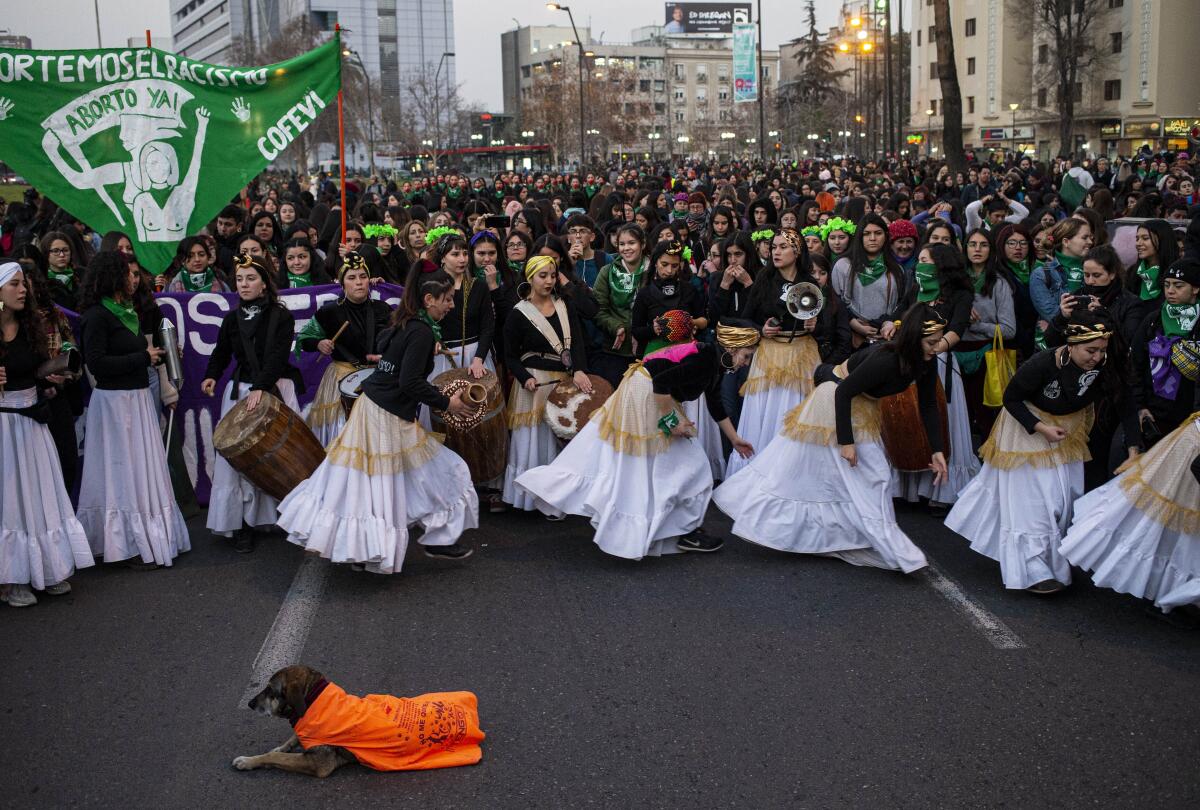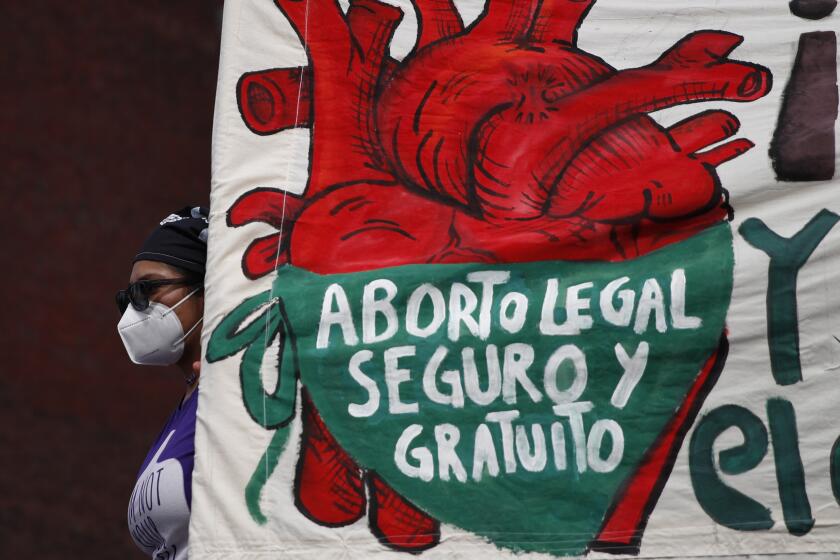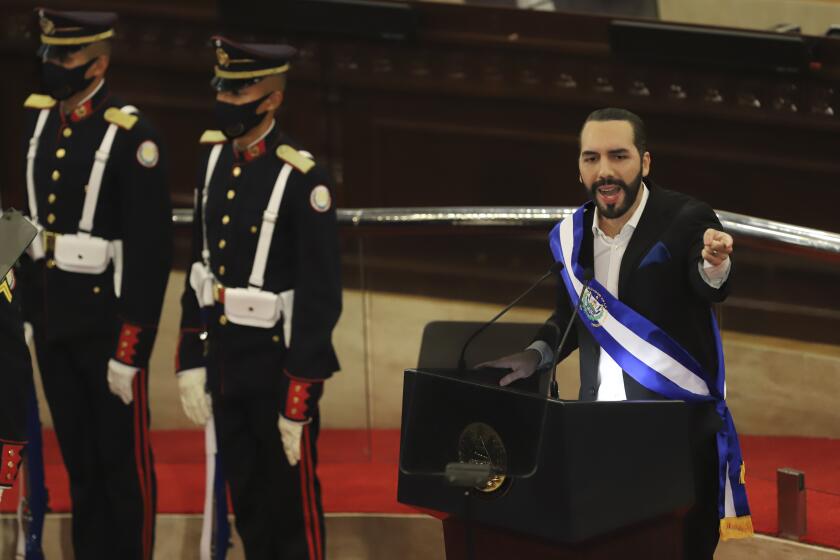Across Latin America, abortion restrictions are being loosened

MEXICO CITY â A historic ruling by Mexicoâs Supreme Court last week is the latest in a series of victories for abortion rights advocates in Latin America, a largely Roman Catholic region that has long had some of the worldâs most restrictive laws against the procedure.
The vast majority of women in the region still lack access to legal abortions, but restrictions have now been lifted or relaxed over the last 15 years in at least half a dozen countries.
âThis is a long fight, it takes a lot of time and work to change minds and perceptions,â said Cristina Rosero, legal advisor for Latin America and the Caribbean for the Center for Reproductive Rights, an abortion rights group based in New York. âBut I think we are reaching a turning point.â
The shift in Latin America comes in contrast to the United States, where several conservative states have passed antiabortion laws in recent months, and the Supreme Court seems poised to at least trim the constitutional protection the procedures currently have. Both in the U.S. and in Latin America, powerful opponents of legalization include the Roman Catholic Church, evangelical Christian denominations and conservative politicians.
But advocates for abortion rights have been buoyed by a wave of feminist activism that has swept across Latin America and the Caribbean in recent years, shaking historically male-dominated power structures.

Through political pressure campaigns organized on social media and sometimes violent street protests, the movement has succeeded in bringing reproductive rights â along with the issues of workplace equality, female political representation and crimes against women â to the forefront of the political agenda.
Marchers from Chile to Mexico demanding equality for women now brandish the green handkerchiefs that abortion rights demonstrators in Argentina have waved as symbols of their signature movement.
In January, Argentina formally legalized abortion in the first 14 weeks of pregnancy, following Senate passage of a law allowing the procedure.
Argentine lawmakers acted despite an appeal from Pope Francis â their revered countryman â to reject expansion of abortion rights.
âIs it justice to eliminate a human life to solve a problem?â the pontiff asked in a letter sent to former students as the abortion bill was being debated in Buenos Aires. âIs it justice to hire an assassin to solve a problem?â
Mexicoâs Supreme Court has ruled that it is unconstitutional to punish abortion.
In Mexico, the Supreme Court threw out a statute in the state of Coahuila â which borders Texas â that imposed prison terms of up to three years for women who had abortions and for anyone who assisted them.
The courtâs president, Arturo Zaldivar, called the decision a precedent-setting âwatershedâ for the country.
Until the changes in Argentina and Mexico, only smaller nations â Cuba, Uruguay and Guyana â had decriminalized abortion.
In another potential landmark case, the Colombian Constitutional Court is expected to rule in coming weeks whether to dramatically expand abortion rights.
As in many Latin American countries, the only exceptions there currently are cases of rape, incest, fatal fetal impairments and threats to the health of the mother.

Before the seismic shifts in Argentina and Mexico, change in regional abortion law has generally been incremental.
In April, justices in Ecuador decriminalized abortion in all cases of rape. Previously, only rape victims with mental disabilities could qualify.
In Chile, activists inspired by the change in neighboring Argentina hope to utilize an ongoing constitutional-rewrite process to broaden access. Until 2017, Chile largely banned abortion outright. The 2017 legislative change permitted the procedure in cases of rape, unviable fetuses and to save a motherâs life.
The loosening of restrictions in Latin America comes as the debate over abortion in the United States reaches a new level of contentiousness.
This month in a 5-4 vote, the U.S. Supreme Court declined to void a Texas law that prohibits abortion after six weeks â before many women know they are pregnant â even in cases of rape or incest.
The justices made clear they were not deciding the constitutionality of the law, which could still be struck down. But the decision raised the specter that the courtâs new conservative majority could eventually overturn Roe vs. Wade, the 1973 decision that guarantees a womanâs right to abortion.
In Latin America, abortion rights advocates have turned to courts as well as legislatures to advance their cause.
Activists have often stressed health concerns in an effort to dodge moral imponderables. They argue that because women will seek abortions regardless of legality â backdoor terminations kill hundreds of women each year in Latin America, according to the World Health Organization â it is better that they have access to a safe, lawful process.
âWe put the focus on how women from the most vulnerable communities â they live in poverty, suffer from discrimination, probably donât have access to resources or education â are most in need,â Rosero said.
While mostly underground, abortion is widely available in Latin America and the Caribbean.
The Guttmacher Institute, a New York-based research group that supports abortion rights, estimated that between 2010 and 2014 nearly a third of all pregnancies in the region ended in abortion.
The biggest stage for the abortion debate in Latin America is Brazil, home to the worldâs largest Catholic population.
The issue bolted into the headlines in Brazil last year when a 10-year-old girl from EspĂrito Santo state was found to be pregnant, the result of rape by her uncle, according to Human Rights Watch. Though she was legally entitled to an abortion, one hospital initially refused to perform the procedure.
She eventually had the abortion, but antiabortion protestors â who published the girlâs name â blocked the entrance of the hospital where the procedure was performed. The girl, holding two stuffed animals, had to enter hidden in a minivan.
On the legal front, a case that could potentially lead to broader decriminalization has been pending before Brazilâs high court since 2017, but experts donât expect a decision anytime soon.
âThe situation in Brazil, unfortunately, appears to be the opposite of that in Mexico,â said Juliana Cesario Alvim, an abortion rights activist and professor of human rights at the Federal University of Minas Gerais. âWe have a very conservative federal government that is vocally opposed to reproductive rights and womenâs rights.â
Advocates have pinned their hopes on the possibility that President Jair Bolsonaro, a right-wing populist, can be defeated in elections next year.
In the meantime, he has vowed to prevent any loosening of restrictions and denounced the historic shift in neighboring Argentina.
âI mourn for the lives of Argentine children, now subject to being ripped from the bellies of their mothers with the consent of the State,â he tweeted after the Senate vote in Buenos Aires. âIf it depends on me and my government, abortion will never be approved on our soil. We will always fight to protect the life of the innocent.â
Other opponents are also hunkering down.
Lawmakers in Honduras â which suffers from one of the worldâs highest rates of sexual violence â passed a constitutional amendment in January designed to block any future effort to legalize abortion, even for rape victims.
Honduras is among at least six nations in the region â the others are El Salvador, Nicaragua, the Dominican Republic, Haiti and Suriname â with blanket prohibitions on abortion, according to the Center for Reproductive Rights.
President Nayib Bukele faced international condemnation after his supporters moved to fire a third of the nationâs judges and clear the way for Bukele to seek a second term.
Still, abortion rights advocates have been able to get some jailed women sprung or their cases dismissed, notably in El Salvador.
Sara Rogel, a Salvadoran woman, was released from jail in the Central American nation in June after serving nine years of an initial 30-year sentence for terminating her pregnancy. Her lawyer said she had fallen and suffered a miscarriage and should never have been prosecuted.
In Mexico, where the leftist president, AndrĂŠs Manuel LĂłpez Obrador, has maintained public neutrality on the abortion question, the Supreme Court decision Tuesday will not change things overnight.
Legal abortions within the first 12 weeks of pregnancy are currently only available in Mexico City and the states of Oaxaca, Veracruz and Hidalgo.
Broad implementation of the court ruling could take many months if not longer. The decision voided the law in the state of Coahuila but did not strike down restrictive abortion statutes still on the books in 28 other states.
Activists vowed to go âstate to stateâ in a bid to pressure local lawmakers to comply with the high court ruling, filing lawsuits if necessary.
âWeâre going to keep on working so that the penal codes are changed in the states â and then we can talk of a decriminalization of abortion in Mexico,â said Isabel Fulda, an abortion-rights activist in Mexico City. âThat is the next step.â
Special correspondents Cecilia SĂĄnchez and Liliana Nieto del RĂo contributed to this report.
More to Read
Sign up for Essential California
The most important California stories and recommendations in your inbox every morning.
You may occasionally receive promotional content from the Los Angeles Times.














